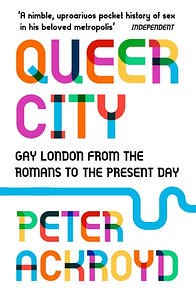Take a photo of a barcode or cover
informative
reflective
medium-paced
This is an excellent historical account of sexual diversity in London, but also the whole of Britain throughout the ages. Homosexuality was rarely the accepted norm of contemporary times, and it is great to see that Ackroyd focused on this current period nearly proportional to the time in history it took us to get here. What is more remarkable is how he identifies what the key drivers were at each point that led to the specific contemporary view towards sexual habits. Individual freedom to exercise one's identity might have been the norm during Celtic, Roman and Norman times, but then it was to be persecuted gravely as a result of political interest during the Tudor period, Christian insecurity in the years to follow, and the hetero normative thinking of the Victorian age. With a sympathetic, yet neutral eye, Ackroyd left us with an account that would hopefully not just enlighten us, but might help us to never repeat the ills of history.
challenging
informative
reflective
Found it difficult that so much of it was based on criminal activity but I guess for the most part it is the only record we have. The chapter on 1960 onwards was brilliant though
While occasionally useful for interesting facts and revelations, I knew I was going to have problems with this book the moment it arrived in the mail; its size. I was expecting a tome, and I received a slim volume instead. Considering that the time period covered in the book is nearly two thousand years, this really highlights the major problem with this book. It's too short. It's too short to properly cover nearly any of its material, and I think it would probably be useful to a reader acquainted with only the least LGBT history. As someone who was looking for some information on early sexuality in England for writing research, I was disappointed, as I found throughout that I knew most of the basic facts presented myself, and it made me uncomfortable on occasion when the author presented something I knew to be mere conjecture as probably fact, as I have no way of knowing what he did the same to throughout the book.
The shortness of the book means that many subjects were not covered properly, something that became more and more apparent as the book went on and more material became available for the author to not use. By the time the book was in the modern era, huge segments of LGBT history were being squeezed into a few pages, which went from poorly written to very insensitive when the entire AIDS epidemic was fit into a couple pages. The author also seems to have a chip on his shoulder about the current state of the LGBT movement, as he accuses it of being sedate and 'domestic' when it used to be active, decrying the closing of gay clubs and shaking his head at the fact that gay people just want to form families instead of continuing to be ostracized. He also decides to spend the very last few pages of the book pulling an Abraham Simpsons Old-Man-Yells-At-Cloud bit at identity politics, which leaves a decidedly bad taste in one's mouth.
And there's something else- having read similar books (New York: Gender, Urban Culture, and the Making of the Gay Male World, 1890-1940, a better, much more thorough book, comes to mind) about gay culture in a big city, the author completely failed to convince me that London has any unique gayness about it, the way he was attempting to postulate. I came away thinking that Londond is like every big city, a place where LGBT people could find each other more easily because there were more of them and in more physical proximity together, making the building of a community much easier.
Next, I dislike the author's use of the word queer- I obviously knew going it it would be around because of the titile, but like so much of this book, he seems like an older man struggling to grasp modern day terminology and applying it in incorrect situations- for example, the term "the queers", as in "the queers were sitting down" has never, at least in my own involvement in the LGBT community, been reclaimed in an academic setting, and it was cringeworthy to read page after page of people who would have objected to the use of the word to describe them because of its contemporary meaning being called by a still-stigmatized version of the word.
Lastly, I want to say that this book is not entirely without joy or merit, but that's because of the personalities of the people whose lives the author is recording shine through occasionally; the tales of men dying for their sexuality/sexual acts by the crowd at the pillory or Oscar Wilde, mid scandal, shouting "Let me in, Willie, or I shall die on the streets!" to his brother's window, are emotional not because of the author's way of telling them, but despite him. Even this book can't hide that.
The shortness of the book means that many subjects were not covered properly, something that became more and more apparent as the book went on and more material became available for the author to not use. By the time the book was in the modern era, huge segments of LGBT history were being squeezed into a few pages, which went from poorly written to very insensitive when the entire AIDS epidemic was fit into a couple pages. The author also seems to have a chip on his shoulder about the current state of the LGBT movement, as he accuses it of being sedate and 'domestic' when it used to be active, decrying the closing of gay clubs and shaking his head at the fact that gay people just want to form families instead of continuing to be ostracized. He also decides to spend the very last few pages of the book pulling an Abraham Simpsons Old-Man-Yells-At-Cloud bit at identity politics, which leaves a decidedly bad taste in one's mouth.
And there's something else- having read similar books (New York: Gender, Urban Culture, and the Making of the Gay Male World, 1890-1940, a better, much more thorough book, comes to mind) about gay culture in a big city, the author completely failed to convince me that London has any unique gayness about it, the way he was attempting to postulate. I came away thinking that Londond is like every big city, a place where LGBT people could find each other more easily because there were more of them and in more physical proximity together, making the building of a community much easier.
Next, I dislike the author's use of the word queer- I obviously knew going it it would be around because of the titile, but like so much of this book, he seems like an older man struggling to grasp modern day terminology and applying it in incorrect situations- for example, the term "the queers", as in "the queers were sitting down" has never, at least in my own involvement in the LGBT community, been reclaimed in an academic setting, and it was cringeworthy to read page after page of people who would have objected to the use of the word to describe them because of its contemporary meaning being called by a still-stigmatized version of the word.
Lastly, I want to say that this book is not entirely without joy or merit, but that's because of the personalities of the people whose lives the author is recording shine through occasionally; the tales of men dying for their sexuality/sexual acts by the crowd at the pillory or Oscar Wilde, mid scandal, shouting "Let me in, Willie, or I shall die on the streets!" to his brother's window, are emotional not because of the author's way of telling them, but despite him. Even this book can't hide that.
informative
fast-paced
hopeful
informative
sad
medium-paced
informative
fast-paced
informative
fast-paced
really liked this one and the expanse of history that was represented here, enjoyed the style of writing, but it really came to life for me after my trip to london so i could visualize exactly where things were taking place.
Actual Rating: 2.5 stars
Unfortunately not a good read. Well researched, possibly too much, as it becomes closer to a rumor mill than an in-depth look at queer life in London. Ackroyd's writing is very blase towards important discussions around consent, especially surrounding power dynamics and age. He often mentions them in the text as examples of "queerness" instead of discussing them as thoroughly as they deserve. Casually passes over the context in many scenarios in favor of his "droll" humor that left me with more questions than answers.
Unfortunately not a good read. Well researched, possibly too much, as it becomes closer to a rumor mill than an in-depth look at queer life in London. Ackroyd's writing is very blase towards important discussions around consent, especially surrounding power dynamics and age. He often mentions them in the text as examples of "queerness" instead of discussing them as thoroughly as they deserve. Casually passes over the context in many scenarios in favor of his "droll" humor that left me with more questions than answers.
informative
reflective
This is a well researched book that is vital to the education on queer Britain. It is written in an accessible tone and offers the beginnings of an intersectional approach.
However, the book is full of Ackroyd’s opinions which are of course biased and often problematic. The way in which trans and gender non-confirming identifies are covered, discussed and problematised is the best example of this. The language and the tone is often dismissive and sometimes derogatory. The brief discussion on privilege lacks any attempt at engagement with the topic let alone nuance and openness.
Much of the book centre cis-white upper/middle class male queer experiences although some attention is given to lesbianism in the same bracket.
I would say this book offered me a good starting point for research into queer British history but I find podcasts equally well researched and far more nuanced and informative.
However, the book is full of Ackroyd’s opinions which are of course biased and often problematic. The way in which trans and gender non-confirming identifies are covered, discussed and problematised is the best example of this. The language and the tone is often dismissive and sometimes derogatory. The brief discussion on privilege lacks any attempt at engagement with the topic let alone nuance and openness.
Much of the book centre cis-white upper/middle class male queer experiences although some attention is given to lesbianism in the same bracket.
I would say this book offered me a good starting point for research into queer British history but I find podcasts equally well researched and far more nuanced and informative.
informative
fast-paced




